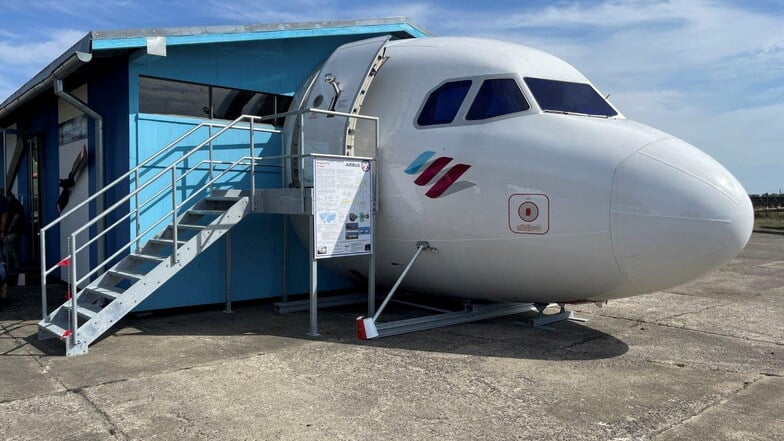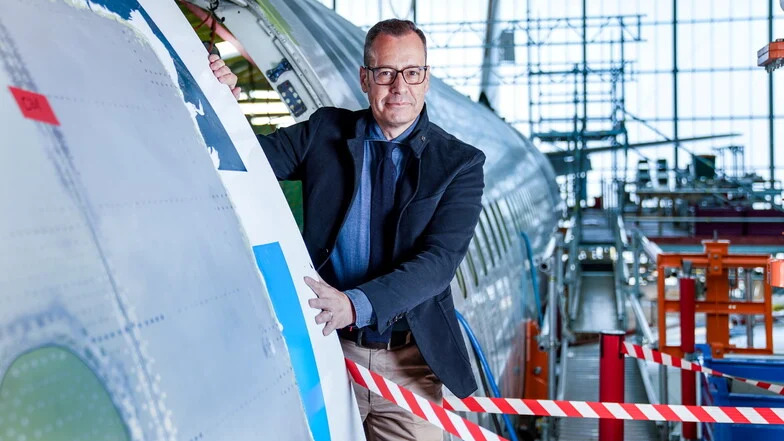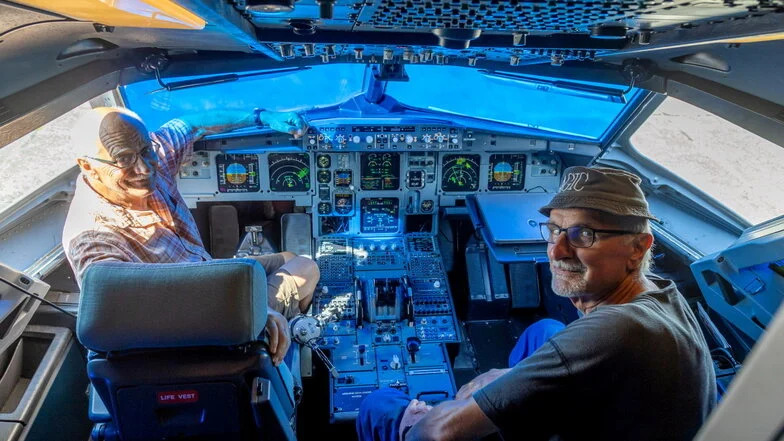Von Michael Rothe
Reinhard Röhle ist happy – wie alle rund 30 Mitglieder des Luftfahrttechnischen Museumsvereins in Rothenburg. Vor zwei Wochen haben sie am einstigen Militärflugplatz nahe Niesky ein ganz besonderes Ausstellungsstück ergattert: das Cockpit eines Airbus A 319. Das Originalteil mit seinen vier Metern Durchmesser sei nun „das absolute Highlight“ der Sammlung neben rund 20 Militärmaschinen, Dutzenden Triebwerken, Rettungsgeräten und Fahrzeugen, schwärmt der 74-jährige.
Während für die Luftfahrtfreaks ein Traum in Erfüllung geht, ist jener der Elbe Flugzeugwerke (EFW) in Dresden geplatzt. Das Cockpit ist letzter Zeuge ihres gescheiterten Recyclingprojekts. An der Grenze zu Polen sollten ausgediente Flieger ausgeschlachtet, Ersatzteile aufgearbeitet, Verbundstoffe wiederverwertet werden.

Die dreiköpfige Geschäftsführung und die Gesellschafter der EFW – ST Engineering in Singapur und Airbus in Taufkirchen bei München – hatten sich lange schwergetan, den Daumen für das 2020 gestartete Projekt zu senken. „Wir sind aufgrund von Projektstudien in Rothenburg an den Start gegangen und haben zwei Airbus-Flugzeuge umfassend recycelt“, sagt EFW-Geschäftsführer Jordi Boto zu Saechsische.de. Die Erwartungen hätten sich nicht erfüllt. „Flugzeugrecycling bietet für ein wirtschaftliches Engagement kein ausreichendes Potenzial. Hinzu kommt, dass es sehr schwierig ist, sich am Markt zu platzieren“, so Boto.
Das Projekt sollte Teil eines Technologiecampus für grüne Kreislaufwirtschaft werden. Flugzeugrecycling sei angesichts knapper werdender Ressourcen „ein Riesengeschäft“, hatte Botos Vorgänger Andreas Sperl noch 2021 verkündet. Schließlich würden bis 2026 weltweit rund 4.000 Kurz- und Mittelstreckenflugzeuge außer Dienst gestellt. Laut Plan sollten jährlich neun Großraumflieger ausgeschlachtet werden. Doch der Recycling-Vorreiter hatte das Second-Hand-Geschäft überschätzt.
Ziel: der erste Weltkonzern mit Sitz in Sachsen
Die Flugzeugwerke mit gut 2.200 Beschäftigten aus über 30 Nationen haben auch ohne neues Standbein gut zu tun. Als eines der größten Industrieunternehmen in Sachsen sind sie weltweit führend im Umbau von Airbus-Passagier- zu Frachtflugzeugen. Mit einem Auftragsbestand von mehr als 200 Flugzeugen seien die Kapazitäten über 2027 hinaus ausgelastet, heißt es.
Nach überstandener Pandemie brummt nicht nur das Geschäft mit den Frachtern. Airlines stehen auch für Passagiermaschinen Schlange, was die Komponentenproduktion der Sachsen befeuert. In Dresden und bei den Töchtern Acosa und CCI Assembly in Kodersdorf bei Görlitz werden Leichtbauteile wie Fußbodenplatten, Seitenverkleidungen, Trennwände, Cockpittüren, Toiletten und Schlafkojen für Crews hergestellt. Über 12.000 Flugzeuge sind mit Bodenpanels von dort unterwegs. Ferner reparieren und warten die Dresdner neben Airbussen auch den Hubschrauber NH-90 der Bundeswehr.

Wichtigster Wachstumstreiber aber ist die Umrüstung von bislang über 250 Passagier- zu Frachtflugzeugen. Im vorigen Jahr seien von Dresden sowie Standorten in China, Singapur und den USA insgesamt 20 umgebaute A 320, A 321 und A 330 ausgeliefert worden, heißt es. In diesem Jahr sollen es mithilfe von Partnern in China und der Türkei gut doppelt so viele werden. Um das zu schaffen, stellen die EFW gut 300 Experten ein – auch etwa 30 Filipinos, ein spezielles Betreuungsprogramm inklusive.
Das Unternehmen wandelt sich vom Wartungs- und Komponentengeschäft im Auftrag Dritter zum Erstausrüster. Als ein solcher OEM spiele man die gleiche Rolle wie Airbus und Boeing, sagt Chef Boto. Alle Aufträge liefen über Dresdner Konten. Der Spanier mit deutschem Pass hatte Sperl 2022 beerbt und im ersten Jahr als Chef eine Umsatz-Verdopplung auf 500 Millionen Euro angepeilt, das Ziel mit 385 Millionen aber verfehlt. Dennoch schielt er bereits auf die Milliarde und hat kühne Träume.
Wiederholt enttäuschte Hoffnungen in Rothenburg
Der Katalane will „das erste Headquarter eines Unternehmens von Weltrang in Sachsen etablieren“. Der 54-Jährige möchte die Wertschöpfung erhöhen, „die Konkurrenz abschütteln, indem wir nicht mehr Komponenten, sondern ganze Toiletten- und andere Systeme liefern“ – und so unabhängiger vom Wohl des Hauptabnehmers Airbus werden. Zudem wittert der Ex-Blauhelmsoldat und Hubschrauberpilot in Ex-Jugoslawien und Angola Geschäfte mit der Luftwaffe. Noch ist nichts entschieden.

Nun fiebert Rothenburgs Museumsverein dem Sonnabend entgegen. Dann wird um 10 Uhr das Airbus-Cockpit eingeweiht, das Museum von 9.30 Uhr bis 17 Uhr geöffnet sein. Eine Förderung des Kulturraums Oberlausitz-Niederschlesien und eine Spende der ansässigen Sparkasse hatten den Erwerb möglich gemacht. Zur Kaufsumme schweigen die Beteiligten.
Das Aus des Recyclingprojekts ist keine Generalabsage der EFW an die Neißestadt. „Wir bleiben mit Rothenburg im Austausch“, verspricht Geschäftsführer Boto. Schon wiederholt waren dort Hoffnungen enttäuscht worden: Frachtflughafen, israelische Rosenzucht, chinesische Elektroautos – alles Luftnummern. „Die neue Absage ist schade, aber kein Weltuntergang“, sagt Uwe Garack, Flugplatz-Chef und Vizebürgermeister. Sie sei „nicht das Ende des Recyclinggeschäfts“, es gebe „lose Gespräche mit anderen Interessenten“. Der 5.000-Einwohner-Ort sei dabei, das angrenzende 45 Hektar große Gewerbegebiet zu entwickeln. „Dabei denken wir auch an autonomes und elektrisches Fliegen“, sagt Garack. Zukunftsthemen für die eigene Zukunft.








